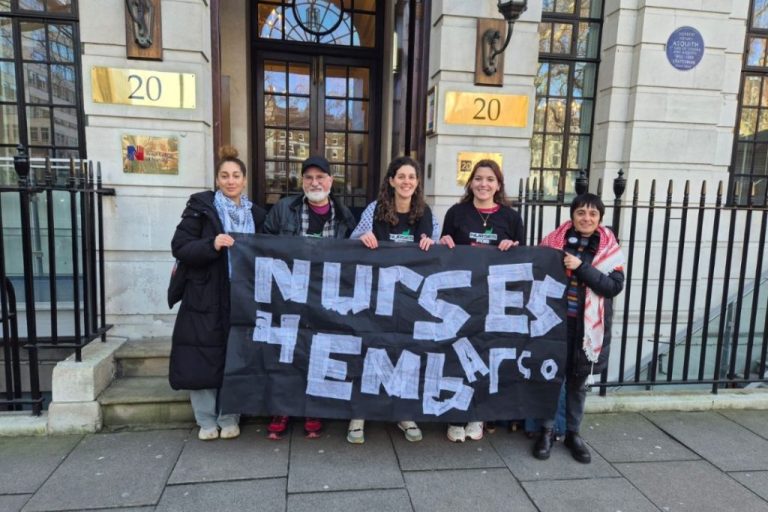A group of nurses has called on the UK Government to end all remaining trade of military equipment with Israel, to support the safety of healthcare workers in the Middle East.
This group, Nurses 4 Palestine, has been urging the Royal College of Nursing (RCN) to lobby the government on the matter and, last month, appeared at an RCN Council meeting to make its case.
“I worked in intensive care through Covid… that was a millionth of what nurses are going through [in Gaza]”
Annafleur Broekman
The UK Government has already suspended export licences for most items used in direct military operations in Gaza, but concern remains about the continued export of F-35 jets, used by the Israeli air force, among other pieces of equipment.
Since October 2023, a conflict between Israel and Palestine, which has raged on and off for decades, flared back up; Hamas, which controls the Palestinian Gaza Strip, attacked Israeli settlements, leaving more than 1,000 dead, including civilians.
The Israel Defense Forces (IDF), Israel’s military, invaded Gaza in response. This invasion, according to the World Health Organization (WHO), left more than 45,000 dead, many of whom were civilians, and more than 100,000 people injured as of January 2025.
According to WHO, attacks by Israel devastated Gaza’s infrastructure, with only around half of the region’s 36 hospitals remaining even partially operational.
Among those who have died or been injured during the conflict have been aid workers, nurses and doctors. The International Council of Nurses has repeatedly joined global calls for both sides to adhere to international law and cease attacks on healthcare settings.
A ceasefire between Hamas and the IDF was agreed in January 2025. However, tensions in the region remain high and there have been reports of ongoing hostilities and weapon use in the Israeli-occupied Palestinian West Bank.
Since the war broke out in 2023, some MPs and campaign groups have demanded that the UK Government ends arms exports to Israel on the grounds that they could be used to violate international law.
In September 2024, foreign secretary David Lammy announced that 30, out of around 350, arms licences to Israel would be suspended due to a “clear risk” that this could happen.
Campaigning groups, including Nurses 4 Palestine, have argued that this is insufficient and demand a total suspension of arms trading with Israel.
Nurses 4 Palestine, last year, sent an open letter to the RCN general secretary and chief executive Professor Nicola Ranger demanding her organisation formally lobbies the government to end the arms licences.
Then on 30 January, the group appeared at an RCN Council meeting to make their demands to the union.
Nurses 4 Palestine member Annafleur Broekman, a registered nurse and senior educator at NHS Education for Scotland, spoke at the meeting.
She outlined the four key demands her group made, which were that the RCN:
Makes a public statement supporting an arms embargo
Lobbies the government on a total arms embargo
Provides resources to support members calling for one
Plays an active role in UK Parliament all-party groups on Gaza
Ms Broekman told Nursing Times: “For us, to me, the most imminent, important thing is a complete arms embargo, because that’s the thing that will stop, or really make a dent in, the killing of healthcare workers [and] the violence that we’re seeing.”
She added: “I worked in intensive care through Covid, and I didn’t think anything could be more difficult than that. But that was a millionth of what nurses are going through [in Gaza].”
Ms Broekman said, in her view, the union had showed inconsistency in its approaches to international conflicts.

Nurses 4 Palestine outside the RCN headquarters in London
She pointed to a £100,000 donation to support the aid response to Ukraine, following the Russian invasion in 2022.
“What we’re saying to [RCN] is: you, in the past, have made these statements,” she added.
“You’ve condemned the Rwanda Bill correctly, in my opinion. You spoke out against absolute atrocities that were occurring in Ukraine.
“How is [Gaza] any different in this circumstance?”
An RCN spokesperson told Nursing Times that the union was “grateful” for the group’s attendance at council, said the nurses made a “powerful case” and promised to update them directly this week on what it would do next.
“The RCN welcomed a letter from Nurses 4 Palestine last year, highlighting the critical situation in Gaza and Lebanon,” the spokesperson said.
“We responded on 1 November 2024 outlining how the RCN is taking action on these issues, including through the formation of our International Academy, which will, alongside international partners, support post-conflict recovery with nurses directly in Gaza.
“The college has also, in line with a resolution passed at congress last year, begun work on a new Humanitarian Crises Framework, ensuring our response to international emergencies is always clear and equitable.
“We stand in solidarity with health workers in Gaza, the West Bank, Lebanon and all affected areas, and condemn in the strongest terms any attacks against them. We offer our heartfelt condolences to all who are impacted by this devastating crisis.”
A UK Government spokesperson said: “In September we suspended export licences to Israel for items used in military operations in Gaza. The licences remaining – body armour for journalists, parts for commercial or trainer aircraft etc. – relate to non-military items, or military items not for use by Israel in Gaza.”
“F-35 components have been excluded from that decision however, because it is not currently possible to suspend licensing of F-35 components for use by Israel without prejudicing the entire global F-35 programme, including its broader strategic role in NATO and military support to Ukraine.”
More on the Israel-Palestine war

